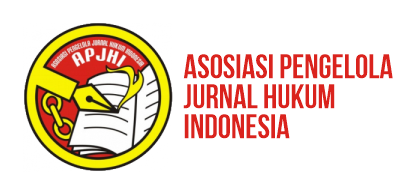The Regulation Of Restrictions On Workers / Labourers Having Marriage In The Same Workplace
Abstract
The purpose of this study was to determine the regulation of restrictions on workers/laborers to marry in one office as regulated in the Decision of the Constitutional Court Number 13/PUU-XV/2017. The method used in this research is normative research and the type of approach used is the law approach, conceptual approach, and case approach. The technique of analyzing legal materials in this study uses a systematic interpretation method. The results of the study show that the provisions of Article 153 paragraph 1 letter f explain that employers are prohibited from terminating employment because the worker/ laborer has blood ties and/or marital ties with other workers/ laborers in the same company unless it has been stipulated in a work agreement, regulations company, or collective work agreement." The limitation of the right to marry in one office is based on a work agreement which is the desire of both parties. Meanwhile, the workers are citizens whose constitutional rights are protected to have a family without being limited by certain parties. This is intended to provide a guarantee of the protection of the constitutional rights of citizens to continue to marry with office colleagues without being limited by work agreements that are far from the spirit of fulfilling workers' rights as citizens. ah exists by considering which aspects will arise between the benefit and the various parties, namely the company/office, employees, and also the general public.
Keywords: Adjustment, Laborer, Marry
Keywords
Full Text:
PDFReferences
Book
Moh. Idris Ramulyo, Islamic Marriage Law: An Analysis of Law no. 1 of 1974 and the Compilation of Islamic Law, Jakarta: PT Bumi Aksara, 2004
Peter Mahmud Marzuki, Legal Research, Jakarta: Prenada Media Group, 2014
Ruqaiyah Waris Masqood, Treasures in Islam, Jakarta: Lintas Pustaka, 2003
Zaitunah Subhan, Al-Qur'an & Women Towards Gender Equality in Interpretation, Jakarta: Kencana, 2015
Journal
Ahmad, Ahmad, and Novendri M. Nggilu. "Denyut Nadi Amandemen Kelima UUD 1945 melalui Pelibatan Mahkamah Konstitusi sebagai Prinsip the Guardian of the Constitution." Jurnal Konstitusi 16.4 (2020): 785-808.
Abdul Hakim Siagian, Omnibus Law in the Perspective of Constitutionality and Legal Policy. Journal of Law Review. 3 No. 1 (2021): 93-111.
Ahmad, Ibrahim, Principles of Justice in Land Dispute Resolution for Development Interests. Journal of Legality 3 No. 2 (2010),
Amer, Nabih, Analysis of the Dissolution of Social Organizations in the Perspective of the Rule of Law. Legality Journal. 13 No. 1 (2020): 1-15.
Arwana, Yudha Chandra, Mediation Paths in Land Dispute Settlement as Encouraging the Fulfillment of Human Rights. Journal of Law Review. 1 No. 2 (2019): 212-236.
Badu, Lisnawaty, Euthanasia and Human Rights. Legality Journal. 5 No. 1 (2012): 1-11.
Bakung, Dolot Alhasni, Determination of Legal Protection for Neighboring Right Holders. Journal of Law Review 2 No. 1 (2020): 65-82.
Fitriyadi, Ahmad Adi, Differentiation of Refugees and Asylum Seekers in International Refugee Law and Its Relation to the Principle of Non-Refoulement. Journal of Law Review 2 No. 2 (2020): 120-138.
Hapsoro, Fakhris Lutfianto, Interpretation of the Constitution in the Examination of Constitutionalities to Realize The Living Constitution. Journal of Law Review 2 No. July 2 (2020): 139-160.
Ismail, Dian Ekawaty, Efforts to Protect the Rights of Suspects/Defendants Through Pretrial Mechanisms in Gorontalo City. Journal of the Legal Pulpit. 21 (1) February (2009): 81-92.
Moha, Mohamad Rivaldi, Urgency of Registration of Electronic System Operators for E-Commerce Businesses. Journal of Law Review 2 No. July 2 (2020): 101-119.
Nggilu, N., & Wantu, F. M, Treading the Constitutional Path to Zaken Cabinet: Efforts to Create a Constitutional Quality Government. Journal of the Law of the Ocean of Justice, 15 No. 1 (2020): 126-140.
Nurdin, Putri Handayani, Legal Politics of Political Education Arrangements by Political Parties. Journal of Law Review 1 No. July 2 (2019): 144-166.
Puluhulawa, Fenty. Tujow, Lusiana M & Sutrisno, Application of the Principles of Justice, Legal Certainty and Benefit in Judge Decisions, Gorontalo Law Review Journal. 3, No. October 2 (2020): 168-187.
Riyadi, Condro S & Thalib, Mutia CH., Guarantee of Legal Protection for Occupational Health and Safety for Construction Workers. 13 No. 2 (2020): 79-93.
Suyanto, Heru & Nugroho, Andriyanto Adhi, Legal Protection of Outsourcing Workers' Rights Based on the Principle of Justice. Juridical Journal. 3 No. 2 (2017): 61-74
Wantu, Fence M., Judges' Constraints in Creating Legal Certainty, Justice, and Benefits in Civil Courts. Journal of the Legal Pulpit. 25 No. 2 . June (2013): 205-218.
Zamroni, A, Developing Villages Without Leaving Outer Groups. Institute for Research and Empowerment (IRE), No. 2 (2016): 1-10,
DOI: https://doi.org/10.33756/eslaj.v1i3.13348
Refbacks
- There are currently no refbacks.
Copyright (c) 2019 Estudiente Law Journal

This work is licensed under a Creative Commons Attribution-NonCommercial-ShareAlike 4.0 International License.
| | | |
| | | | |
| | | | |
| | |
Estudiante Law Journal has been available at:
| | | | |
| | | | |
| | | | |
| | | | |




-2.png)
.png)





